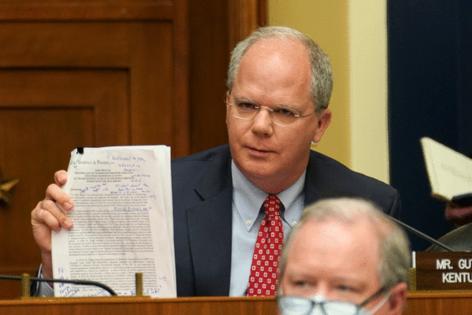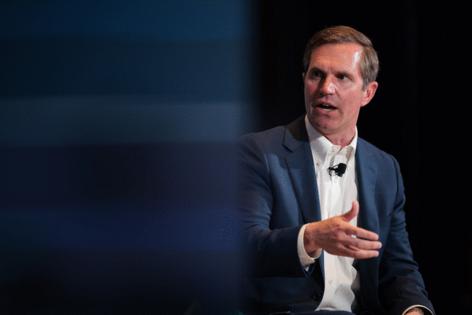Democratic governors decry GOP proposal to 'gut' Medicaid funding
Published in News & Features
Republican efforts to slash billions in Medicaid funding would be “an attack on rural America,” Kentucky Gov. Andy Beshear and three other Democratic governors said this week.
The cuts would strip health care from millions of low-income Americans and cause the closure of dozens of rural hospitals over the next decade, they said on a call organized by the Democratic Governors Association.
Roughly 400,000 Kentuckians “who didn’t previously have (health care) coverage now do in my state,” Beshear, the DGA vice chair, said.
Other DGA leaders speaking out against the GOP’s Medicaid proposal included Kansas Gov. Laura Kelly, who is chair of the association; Hawaii Gov. Josh Green; and New Mexico Gov. Michelle Lujan Grisham.
“Medicaid covers the people we love most in this world: our parents and our kids,” Beshear said. “Half of Kentucky’s kids are covered by Medicaid. Gutting Medicaid would impact families in a substantial way. It would devastate and potentially end rural health care, (which) cannot survive without Medicaid.”
The group assembled Tuesday morning to sound the alarm on the far-reaching impacts of U.S. House Republicans’ plan, which proposes deep cuts to Medicaid, the federal government health insurance program covering approximately 79 million Americans, primarily low-income adults, children and people with disabilities.
The cuts would help foot the bill for President Donald Trump’s proposed spending for border security and tax cuts.
“It absolutely has to be stopped,” Green said Tuesday. “This is the most important battle we will be a part of, I believe, in these next couple of years.”
In February, the U.S. House Budget Committee voted to direct the House Energy and Commerce Committee, which oversees Medicaid funding, to find $880 billion in savings as a way to finance Trump’s spending agenda. Rep. Brett Guthrie, the Republican representing Kentucky’s 2nd Congressional District, chairs the committee.
Experts, joined by congressional Democrats — and many Republicans — have warned of the harm that will follow such massive cuts to the country’s Medicaid program.
A slightly amended proposal has emerged in recent weeks to ostensibly lessen the blow of those cuts by placing “per capita caps” on Medicaid funding to certain health care providers in states that have expanded the federal health insurance program under the Affordable Care Act, like Kentucky.
That plan also includes creating a “rainy day fund” for individual states, where state governments could contribute any additional funds they may have to help fund their Medicaid program.
Even if this new plan passes, the impacts of such cuts “would devastate and potentially end rural health care, (which) cannot survive without Medicaid,” Beshear said.
In June 2024, Medicaid and CHIP, or the Child Health Insurance Program, covered 1.4 million adults and children in Kentucky, according to the Kaiser Family Foundation. Medicaid and CHIP enrollment is 10% higher than before the start of the COVID-19 pandemic in 2020.
In a state like Kentucky, where half of the children — nearly 492,000 — and roughly a quarter of all adults are covered by Medicaid, gutting the federal program would also impact rural hospitals, whose operating budgets heavily rely on federal funding, since most of their patients are on Medicaid.
Governors on Tuesday’s call also cited how unpopular cuts to Medicaid are with Democrats and Republicans alike, citing a Kaiser Family Foundation survey in April that found upwards of 75% U.S. adults polled opposed Medicaid cuts.
But Kentucky Senate President Robert Stivers, speaking at a separate event Tuesday, said he has talked to Guthrie about this situation, and feels there are too few details about what the potential cuts could entail, so it’s premature to judge the impact.
“I think people are trying to make it an issue without knowing what the final product is,” he said at a policy luncheon in Lexington Tuesday. “How do you criticize something when you don’t know what it is, unless you want to make it a political issue?
“We are not pre-judging. If the governor has some type of knowledge, I’d ask him, ‘where are you getting your information?’ Because we’re pretty much getting it directly from the source,” Stivers said.
Even if the specifics are still being ironed out, major cuts to Medicaid in any form or fashion will hit Kentucky’s rural regions hardest, where many residents rely on government health insurance. Beshear on Tuesday singled out Eastern Kentucky’s 5th Congressional District, where Republican U.S. Rep Hal Rogers is serving his 22nd term.
“Whether it’s the human argument, because of how people will be impacted negatively . . . or the economic argument,” Beshear said. “Many of our Republican representatives and state senators are in districts where health care workers won’t exist if these Medicaid cuts happen.”
Rural hospitals are “one of the largest employers in Hal Rogers’ district . . . (and) some of the most important economic drivers out there,” he said.
Rogers has told the Herald-Leader he is steadfastly against cutting Medicaid.
“I want to set the record straight on the fear tactics that have people worried about their benefits being taken from them,” he said in a statement Monday. “Nearly half of the people living in my congressional district are recipients of Medicaid benefits, so I have no intention of cutting benefits for the people who need them.
“In fact, I want to protect our benefit programs for years to come,” Rogers said. “And the best way we can do that is to remove the waste, fraud and abuse of Medicaid, Medicare and Social Security.”
Citing findings from the U.S. Government Accountability Office, $31 billion “improper” Medicaid payments, like overbilling, fraud and inaccurate record keeping, were made in 2024, Rogers said.
“We can’t afford for those programs to bleed out vital taxpayer dollars that are desperately needed for our most vulnerable Americans,” Rogers said. “I’m here to protect those programs for people who really need them, and we can’t do that without getting rid of the waste, fraud and abuse.”
Still, those Medicaid payments made in error make up a fraction of the current proposed cuts. Everything from Medicaid funding for prenatal and post-partum care, to behavioral health services, to addiction treatment options will be impacted by the proposed spending plan, Beshear said.
Later Tuesday afternoon, lauding Kentucky’s addiction treatment providers in a state Capitol rotunda press conference for helping to reduce the rate of fatal drug overdoses by 30% in 2024, Beshear said that work wouldn’t have been possible without Medicaid, which he called a “game-changer.”
Being that “over 142,310 Kentuckians got help through Medicaid,” the governor said, “cuts to Medicaid could stop our progress.”
---------
—Herald-Leader writer Austin Horn contributed to this story.
©2025 Lexington Herald-Leader. Visit at kentucky.com. Distributed by Tribune Content Agency, LLC.










Comments